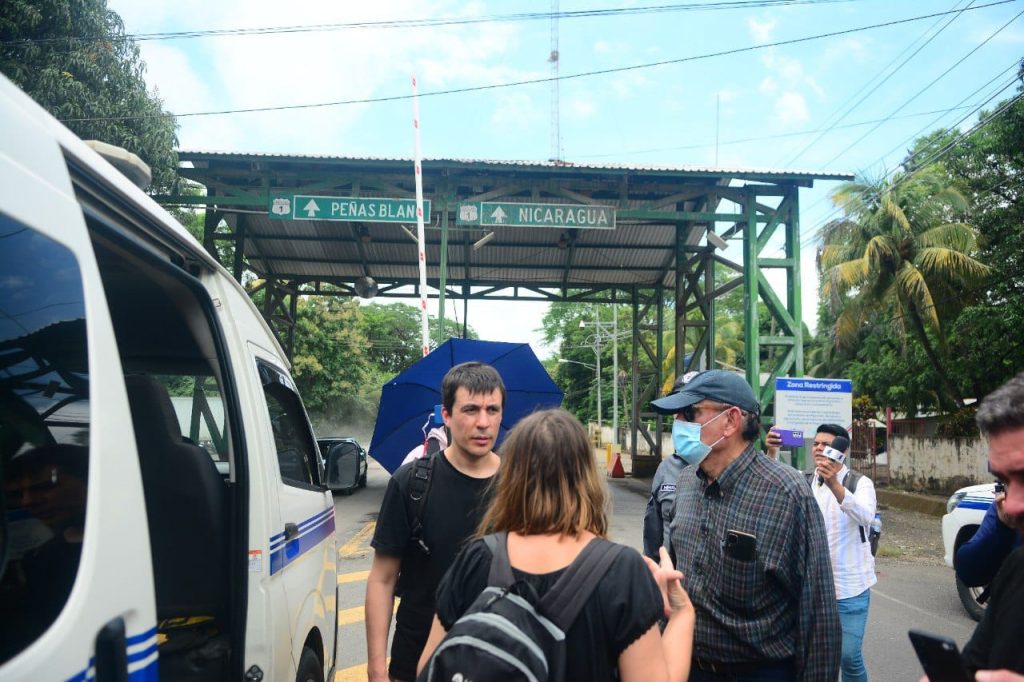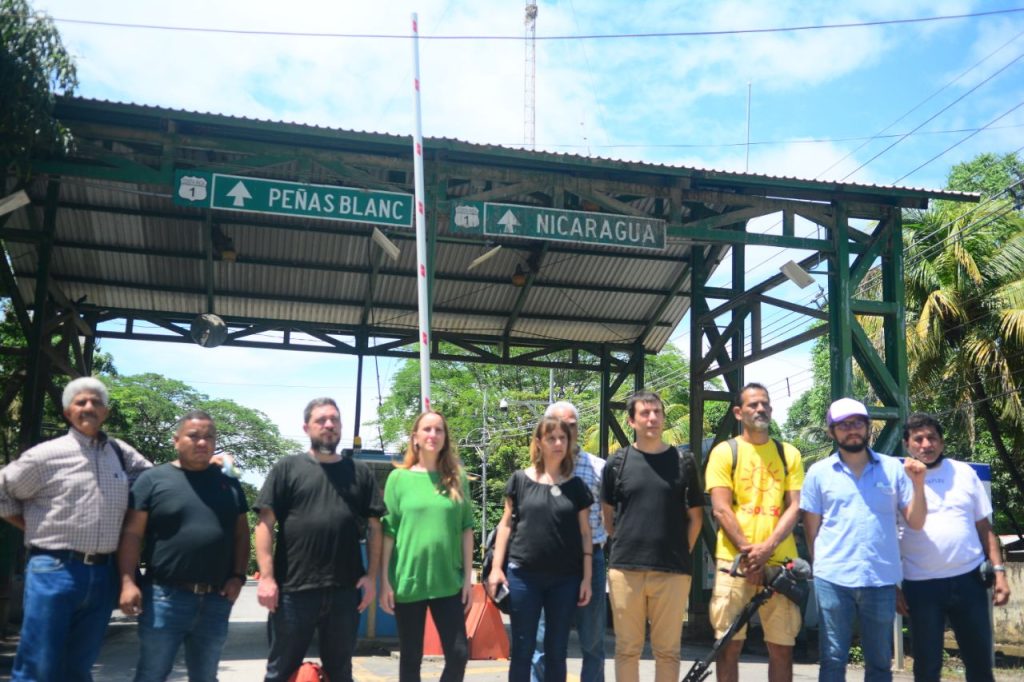En el día de ayer, la Comisión Internacional por la libertad de las y los presos políticos en Nicaragua, impulsada por la Liga Internacional Socialista junto al PRT de Costa Rica, Alternativa Anticapitalista de Nicaragua y en unidad de acción con numerosas organizaciones de familiares, políticas y sociales de todo el continente, recorrió los 300 kilómetros que separan San José de Costa Rica del puesto fronterizo Peñas Blancas en Nicaragua. El impacto regional e internacional de la noticia se transformó en el acontecimiento político más importante de Centroamérica durante los últimos días y logro instalar en la opinión pública el reclamo de libertad a los más de 180 detenidos por luchar contra la dictadura capitalista que gobierna Nicaragua.

La dictadura de Ortega-Murillo acuso el golpe y reacciono militarizando la frontera para impedir que la Comisión Internacional entrara y visitar a a los presos y presas políticos, corroborando de esta forma todas las denuncias realizadas por los familiares y al mismo tiempo mostrando la preocupación por la iniciativa internacionalista motorizada por la LIS. Para conocer más sobre la actividad de la histórica Caravana que llego hasta la frontera nicaragüense entrevistamos a nuestro compañero Mariano Rosa, dirigente del MST en el FITU de Argentina y Coordinador de la Comisión.
Mariano Rosa desde Costa Rica
El viernes desde muy temprano nos fuimos concentrando en San José, capital de Costa Rica, decenas de Buses, Busetas, autos particulares y otros medios de transporte aportados por las organizaciones de familiares, organizaciones sociales y políticas que motorizamos la iniciativa: el PRT y otras organizaciones de Costa Rica, las y los parlamentarios del FITU de Argentina, entre ellos nuestra compañera del MST Luciana Echevarria, integrantes del MES PSOL de Brasil y otros representantes de organizaciones de Panamá, México y República Dominicana.

En los días previos y gracias a la tarea militante de difusión, se fueron sumando adhesiones y voluntades muy importantes al tiempo que se reflejaba una gran simpatía al interior de la propia Nicaragua, más allá del bloqueo del régimen.
Todos los días la equipo organizativo, encargado de la logística, debía incorporar más y más medios de transporte y promediando la semana, recibimos en la Comisión una noticia muy importante; la adhesión del movimiento campesino, con una delegación muy representativa de su campamento en Upala, en la zona norte de Costa Rica camino a Nicaragua, encabezado por Doña Francisca “Chica” Ramírez, una de las lideresas más importante de la las luchas de los campesinos “anti canaleros” y por la libertad de los campesinos presos ubicados en la unidad penitenciaria de los Chontales en Nicaragua.
A esto debemos agregar que un contingente de 30 periodistas acompañó todo el trayecto de la caravana por la dignidad dándole difusión a esta importante iniciativa.
Muestras de simpatía, solidaridad y apoyo social creciente a la iniciativa de la Comisión y la LIS
Durante todo el trayecto de la Caravana, centenares de personas ubicadas a los costados de la carretera saludaban y expresaban su solidaridad agitando banderas azules y blancas, emblemas de la lucha anti dictatorial en Nicaragua. De hecho, está prohibido en aquel país enarbolar la bandera nacional en las calles y está penado con cárcel, por lo tanto, se ha transformado en un emblema de lucha y resistencia anti dictadura, más allá de que sectores del gran empresariado y la iglesia quieran apropiarse su utilización.
Así mismo, hubo durante todo el día y fundamentalmente luego de conocerse el resultado final de la acción y la respuesta del gobierno de Ortega, manifestaciones de solidaridad locales y regionales muy importantes, como por ejemplo la declaración pública y el pronunciamiento contra la política de Ortega-Murillo de la escritora viva más importante de Nicaragua, la reconocida y exiliada Gioconda Belli.
La caravana tuvo una estación previa a la frontera en la localidad de La Cruz, donde se realizó un mitin de confluencia con el movimiento campesino, en el mismo me tocó hablar, en mi carácter de coordinador de la Comisión por la Liga Internacional Socialista, junto a la lideresa Francisca “Chica” Ramirez. Luego de esta actividad partimos custodiados por la policía de Costa Rica hasta el puesto fronterizo ubicado a 300 metros de territorio nicaragüense. Una vez allí y sobre la base de haber previsto y acordado que la policía de Costa Rica acompañaría a la caravana hasta territorio nicaragüense, para insistir con el ingreso a las autoridades migratorias de ese país, sin embargo en la frontera el panorama fue completamente distinto. Por un lado la determinación de la dictadura de Ortega-Murillo de impedir el ingreso de la Comisión con el mensaje amenazante del despliegue militar descomunal, calculando más de 300 efectivos, más francotiradores y paramilitares, que frente a la determinación de la comisión de insistir en cumplir su misión de ingresar, terminaron cerrando efectivamente la frontera con Costa Rica. Frente a esto, el gobierno de Costa Rica en virtual acuerdo con el gobierno de Nicaragua impidió que la comisión se aproximara hasta el puesto fronterizo de Peñas Blancas aduciendo que no podía garantizar la seguridad del contingente y para evitar “crisis o consecuencias graves en la relación diplomática entre Costa Rica y Nicaragua”.
En este punto no podemos menos que denunciar el rol del gobierno del presidente Chavez, en Costa Rica, que en varios episodios demostró que, más allá de alguna manifestación aislada, ha tratado de cohabitar y mantener relaciones con la dictadura y bajo ningún concepto condenarla. Por ejemplo ante la necesidad de designar un funcionario centroamericano para un organismo de la región en las relaciones comerciales con la Unión Europea, inicialmente manifestó acompañar una propuesta de la dictadura de Ortega-Murillo para esa designación, para luego retroceder producto del repudio masivo. También bloqueó la posibilidad del ingreso, negándoles el visado, a jóvenes estudiantes nicaragüenses de la LIS exiliados en Argentina y llegada la Comisión a la frontera actuó en equipo de hecho con la dictadura ya que no hizo nada para facilitar la coordinación para el ingreso efectivo de la Comisión a Nicaragua. Por eso en este punto queremos ser categóricos, el gobierno de Costa Rica trabaja en tándem con el de Nicaragua y más allá de su fachada democrática no ha hecho más que mostrar su total complicidad con aquel.
No se tiene registro de un despliegue militar, con francotiradores de más de 300 efectivos en el puesto fronterizo de Peñas Blancas en los últimos cuatro años. Tampoco que ante la llegada de una Comisión como la que impulsó la LIS, se haya cerrado la frontera como en este caso. Es evidente que el impacto de la acción de la Comisión, la instalación en la agenda pública sobre la situación de las y los presos que logró señalar, la circulación de la noticia en la propia Nicaragua a través de mil canales alternativos a los oficiales controlados por la pareja presidencial, hizo tomar la determinación a la dictadura de, por un lado, realizar una demostración de fuerzas y por el otro, también manifestar la preocupación por el efecto que pudiera tener al interior del país el ingreso de la Comisión con las características de la que impulsamos y construimos.
Obviamente, como primera conclusión queda demostrado que la dictadura que en otras oportunidades invocó que distintas misiones de la llamada “comunidad Internacional”, sin el despliegue ni la fuerza del que tuvimos como Comisión Internacional encabezada por la LIS, eran enviados por la Embajada norteamericana, injerencistas y con salidas golpistas, en este caso con la Comisión compuesta por referencias claramente de izquierda, con una declaración de propósitos con amplia representación y adhesión internacional que fijó una delimitación clara de todo campo imperialista y de todo injerencismo, preocupó de forma tal que los obligó a tomar una decisión escandalosa y desproporcionada.
La muestra de simpatía al interior de Nicaragua, que llegaba a través de mil mensajes, las denuncias de familiares sobre lo que sucede realmente en las cárceles y el interior del país, corroboro con creces que es real lo que la Comisión puso en debate: en Nicaragua hay un Estado policial y una acción permanente de vejación, tortura y violación a los derechos humanos en las cárceles de Nicaragua, esto es un hecho comprobado.
Finalmente saber que esta iniciativa que tomamos en esta oportunidad es solo el primer paso de un movimiento permanente por la vida y la libertad de las y los presos políticos en Nicaragua que seguramente preparará nuevas acciones de mayor impacto ya que tenemos el compromiso que es un juramento con Familiares y organizaciones en el exilio, como parte de la Liga Internacional Socialista de llevar hasta el final esta lucha que llevamos ahora.




